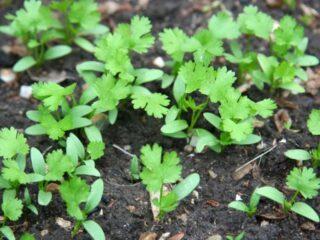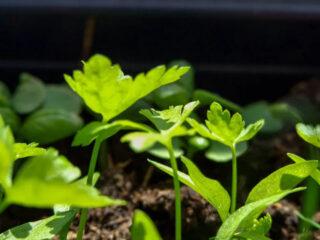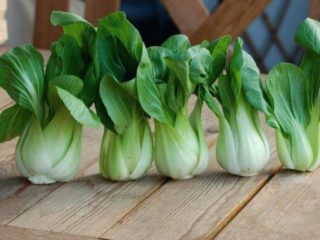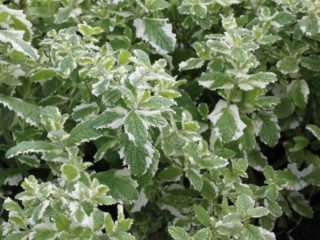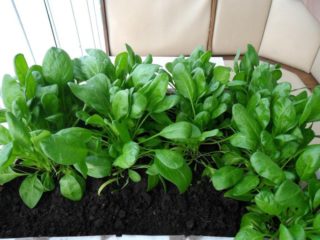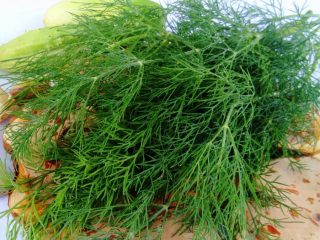Content
Chocolate mint has an unusual color of foliage and an original aroma. An ornamental plant is widely used by cosmetologists, culinary specialists, folk healers, and is grown by gardeners in their personal plots. The culture lends itself well to reproduction, storage in a dried form.
Description of chocolate mint
The variety was developed by Dutch breeders. A distinctive feature of mint is the presence of a purple-brown hue in the color and chocolate aroma, which confirms the name of the culture.
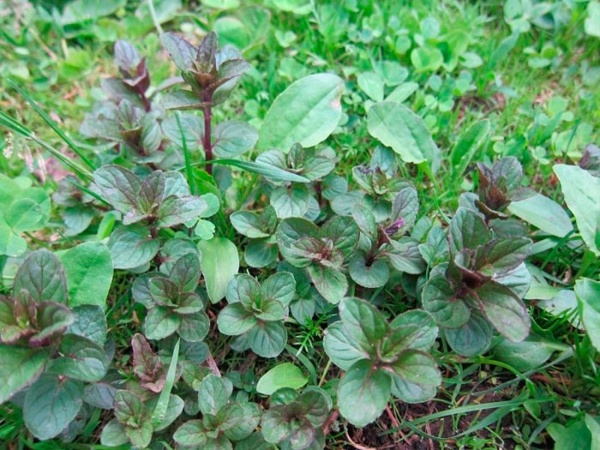
The chocolate variety can be recognized by the purple-brown veins on the leaves.
The plant can be described in more detail as follows:
- The stem of the chocolate mint grows vertically. If you pinch the tops, you get a branched bush up to 60 cm high. The peel of the stem is rarely covered with fine hairs.
- The arrangement of mint leaf plates is opposite to each other. The leaf shape is elongated and rounded. The surface is wrinkled with veins. There are notches on the edges of the leaves. The color is dark green mixed with a purple-brown tint.
- The inflorescences consist of small purple flowers, collected in long panicles.
- In place of faded inflorescences, small seeds appear, about 0.5 mm in size. After ripening, the mint grains acquire a black shell.
In more detail, you can consider the chocolate mint in the photo, where the distinctive features of the variety are clearly visible.
What aroma and taste does chocolate mint have?
If you compare the culture with other varieties of mint, then its essential oils are soft. There is no feeling of coldness in the mouth from menthol. The aroma contains light notes of chocolate.
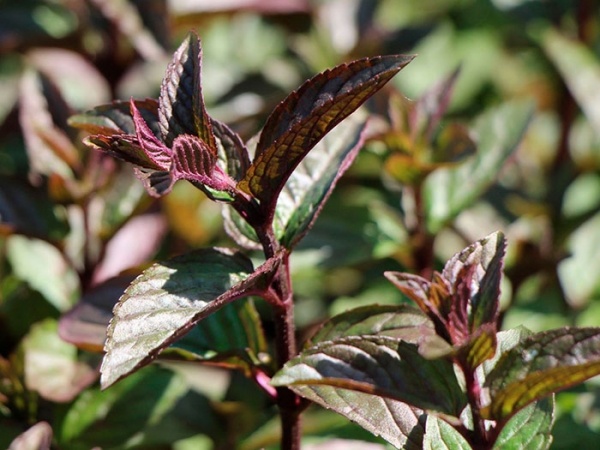
The chocolate color appears intensely on the mint tops
How chocolate mint reproduces
Garden culture propagates quickly and reliably by layering or dividing the bush, that is, by root cuttings. It is more difficult to plant mint on site using green cuttings and seeds.
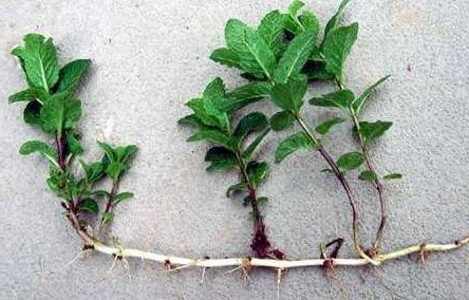
There are many shoots on the long root of mint, which are convenient to propagate a garden plant.
To propagate the variety by the root method, a bush is dug in the garden in spring, summer or autumn. The roots of mint are long and after a certain distance from them young shoots grow. With scissors, you need to carefully cut such a chain into separate seedlings. Each shoot should be left with a piece of the main root and small branches. Cuttings are planted in pots or directly on the garden bed. With abundant watering, chocolate mint will quickly take root. After a couple of weeks, the roots of each seedling will begin to grow, new shoots of chocolate color will appear.
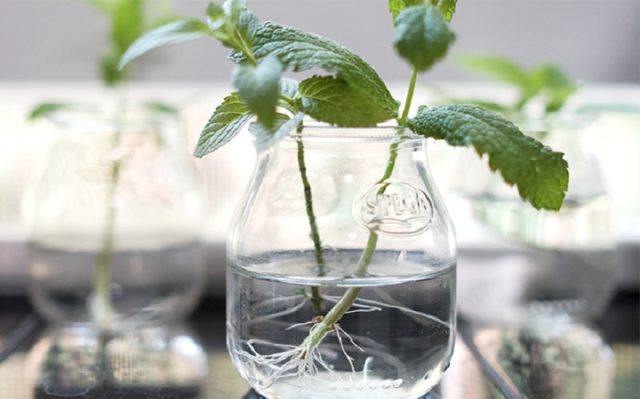
If the cut tops of a chocolate plant are placed in a jar of water, they will take root.
When it is not possible to dig up a chocolate mint bush, it is worth visiting a vegetable market or supermarket. You need to find the freshest cut greens on the shelves. From the acquired bunch of mint, strong twigs with not wilted leaves are chosen. On them, the tops of about 15 cm are cut off with scissors. The cuttings are placed in a glass of water so that the ends of the stems are immersed approximately 2 cm deep. A higher water level is not desirable. The cuttings will start to rot.
After a few days, the mint stalks will root. They continue to be kept in water until the root system grows up to 7 cm long. Ready seedlings are planted in cups with a fertile substrate. When the plants get stronger, grow up, they are transplanted to the garden bed.
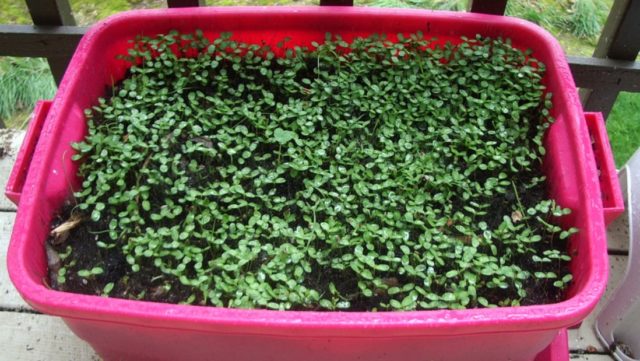
Mint seeds can be grown in a regular plastic bowl
The most difficult and time-consuming process of breeding chocolate garden mint is growing it from seeds. Tricks can happen here, since unscrupulous manufacturers sometimes pack the wrong varieties that are painted on the package. It is better to purchase seeds certified in a nursery or company store.
For sowing, you need to prepare a container. The soil mixture is purchased or made from humus, sand and earth in a 1: 1: 2 ratio. You can add 1 part of peat to the mixture. The soil is loaded into the planting container, grooves 5 mm deep are made with a pencil. Chocolate mint seeds can be sown thickly. After germination, weak excess shoots break through. After sowing, the grooves are covered with soil, moistened with a spray bottle. The container is covered with foil, placed in a warm room for germination. Mint sprouts will appear in about the third week. The film cover is removed, the air temperature is maintained in the room in the range of 20-25 aboutC. Planting mint on the bed is carried out after picking and hardening the seedlings when it grows up.
Health Benefits of Chocolate Mint
The main beneficial substances of the chocolate variety, like any other mint, are essential oils, in particular menthol. The plant is used to prepare antibacterial compositions. Essential oils relieve stomach pain during inflammation of the mucous membrane, have preventive action against gastritis. Mint teas are useful for colds, sore throats, and are a sedative. Menthol improves blood circulation, the work of the cardiovascular system.
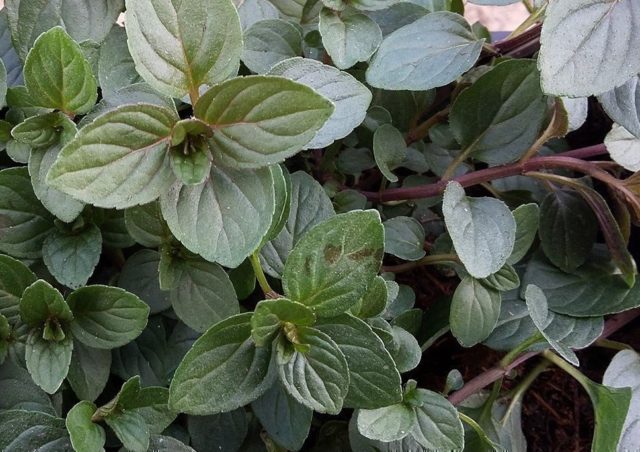
Useful substances are found in a plant of any age
Applying chocolate mint
Despite the fact that the aroma is reminiscent of peppermint chocolate, its beneficial properties are similar to those of traditional garden culture. The plant is widely used in medicine, cosmetology, and cooking.
In folk medicine
Folk healers from a fragrant plant with chocolate leaves prepare infusions that help to heal nervous diseases, disorders of the digestive system. Menthol relieves attacks of nausea well, lowers blood pressure, promotes vasodilation, facilitates breathing with nasal congestion during a cold.
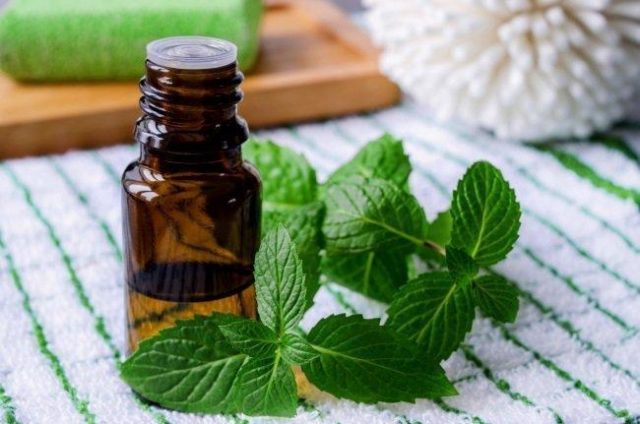
In folk medicine, mint tinctures are popular.
Decoctions of mint help remove stones formed in the gallbladder. Antiseptic substances of the plant eliminate skin rashes, diseases of the oral cavity: periodontitis, stomatitis. You can simply rinse your mouth with peppermint water after eating to freshen your breath.
In cosmetology
For the cosmetic industry, mint is a godsend. The herb extract is widely used as a flavoring agent. Many people prefer menthol-scented shampoos, soaps, body and hair care products. Since essential oils have antibacterial properties, body creams, face masks and hair masks are produced on their basis. From the leaves, women independently make decoctions and infusions that help take care of the skin.
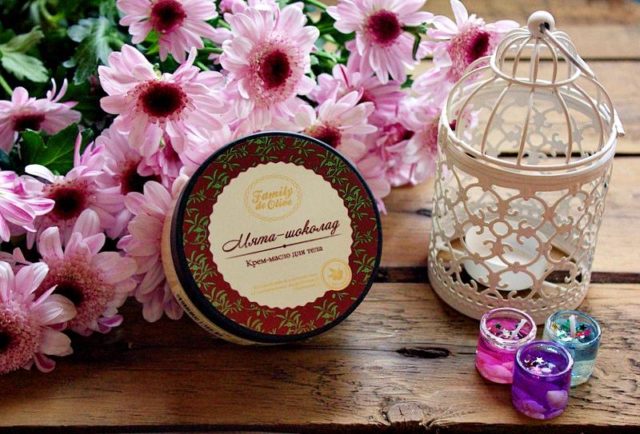
Mint is in demand in cosmetology for the manufacture of creams
In cooking
In cooking, chocolate peppermint is used as a spice. It is often added to meat dishes and sauces. The beautiful chocolate leaves are often used as a simple salad dressing. Mint goes well with desserts. Its chocolate flavor makes the plant popular with bartenders. The leaves are added to alcoholic and non-alcoholic drinks, cocktails, for example, "Mojito".

A few mint leaves will add an original flavor to any dish
Planting and caring for chocolate mint
The chocolate variety, like regular mint, loves moisture. The place is selected partially shaded, but not completely covered by the crown of trees. The soil is preferable fertile, sandy loam or loam.
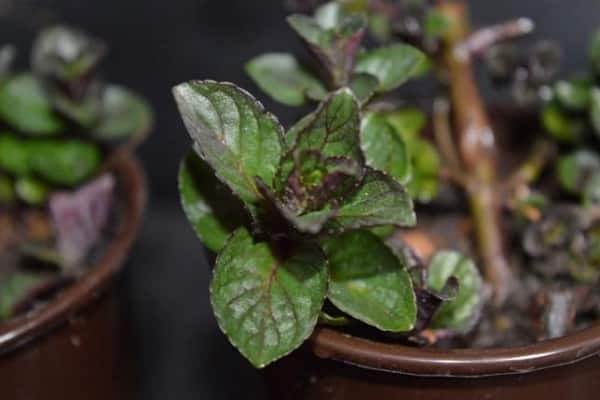
If desired, the chocolate spice can be grown in a flowerpot on a windowsill
If you have ready-made seedlings on your hands, you can plant the plant at any warm season. However, if early spring is chosen, then return frosts should go away. In the fall, they are planted at least three weeks before the expected frost. During this time, the chocolate culture should have time to take root.
Bushes are planted at a distance of 45-60 cm from each other. They will grow over time. It is advisable to immediately fence off the bed by digging in the curb tape or slate. A fence will prevent chocolate mint roots from spreading throughout the area.
Growing features
A garden plant with chocolate leaves is not demanding to care for. For good growth, mint needs regular watering. However, you cannot overdo it either. The culture loves moderate moisture, but not stagnant water.
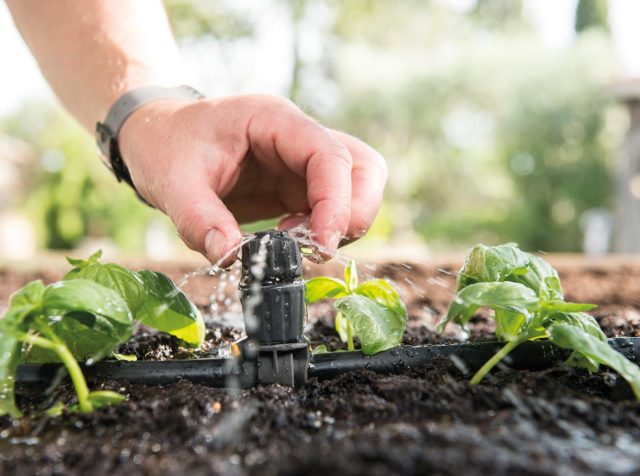
On large plantations with growing mint, it is more convenient to organize automatic watering
While the plants are small, the soil around the bushes is loosened, weeds are removed. When the mint grows, gains strength, it will drown out the weeds by itself. It is advisable to pinch the tops. The process promotes the rapid development of lateral shoots. The plant grows into a bush, which helps to increase the yield of chocolate leaves.
It is advisable to avoid top dressing. Organic and mineral fertilizers can change the aroma of the chocolate spice. If the soil is severely depleted in the garden, it is possible in the summer to fertilize with a mineral complex once, but this should not be done before the start of harvesting.
Since culture loves partial shade, it is not placed on the windows on the south side of the building. However, in winter, it is required to artificially increase the continuation of daylight hours with the help of backlighting. The air temperature is suitable room temperature, within 20-23 aboutFROM.
Pests and diseases
The main pests of mint are mint fleas, green leaf beetles, mint leaf beetles, aphids, leafhoppers, slobbering pennies. They suck sap from young shoots, eat foliage, lay larvae.
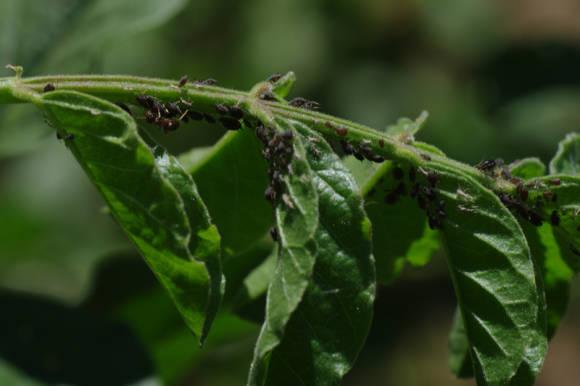
Fragrant mint leaves sometimes attract pests that settle in colonies at the top of the plant
The problem is the fact that it is undesirable to process the chocolate spice with chemicals. It is better to use agrotechnical methods of struggle and folk methods. If the result is unsuccessful, the plantings are sprayed with insecticide one month before harvesting the chocolate leaves.
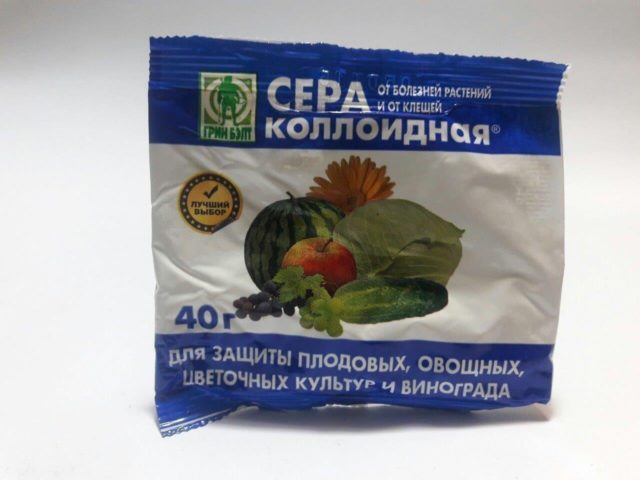
Colloidal sulfur is the best helper in the fight against fungi and other diseases
Of the diseases, mint is affected by powdery mildew, rust. Often the culprit is the person himself. Strong thickening of the plantings and excessive dampness of the beds should not be allowed. If the fungus appears, the mint is sprayed with a colloidal sulfur solution a month before harvesting.
When and how to harvest chocolate mint
Aromatic essential oils are found throughout the aerial part of mint. The crop is harvested by cutting off the stems during the beginning of flowering. With good care of the season, you can get three harvests of chocolate spice. The stems are not cut at the very root, so that the bush has the opportunity to quickly recover.If only chocolate leaves are needed, whole branches are still cut off, and then they are cut off. Do not leave bare stems on the plant.
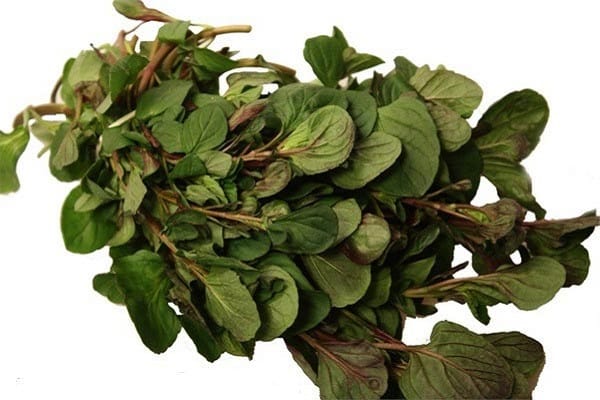
The harvested crop is formed in bunches, stored in a dried form
How to dry chocolate mint properly
For a couple of days, the freshly harvested crop can be stored in the refrigerator by wrapping the branches in a damp cloth. Only drying is suitable for long-term storage. Naturally, mint is dried for about 15 days, spread out in a thin layer in the shade. To speed up the process, use an oven or microwave. Here the chocolate sprigs will dry in 5-6 hours.
The harvest is stored in bunches suspended in a barn on the ceiling or wall. Leaves can be crushed into powder and packaged in hermetically sealed containers.
Conclusion
Chocolate mint on the site will be a great decoration. In addition, the spicy plant will scare away pests from garden crops.

